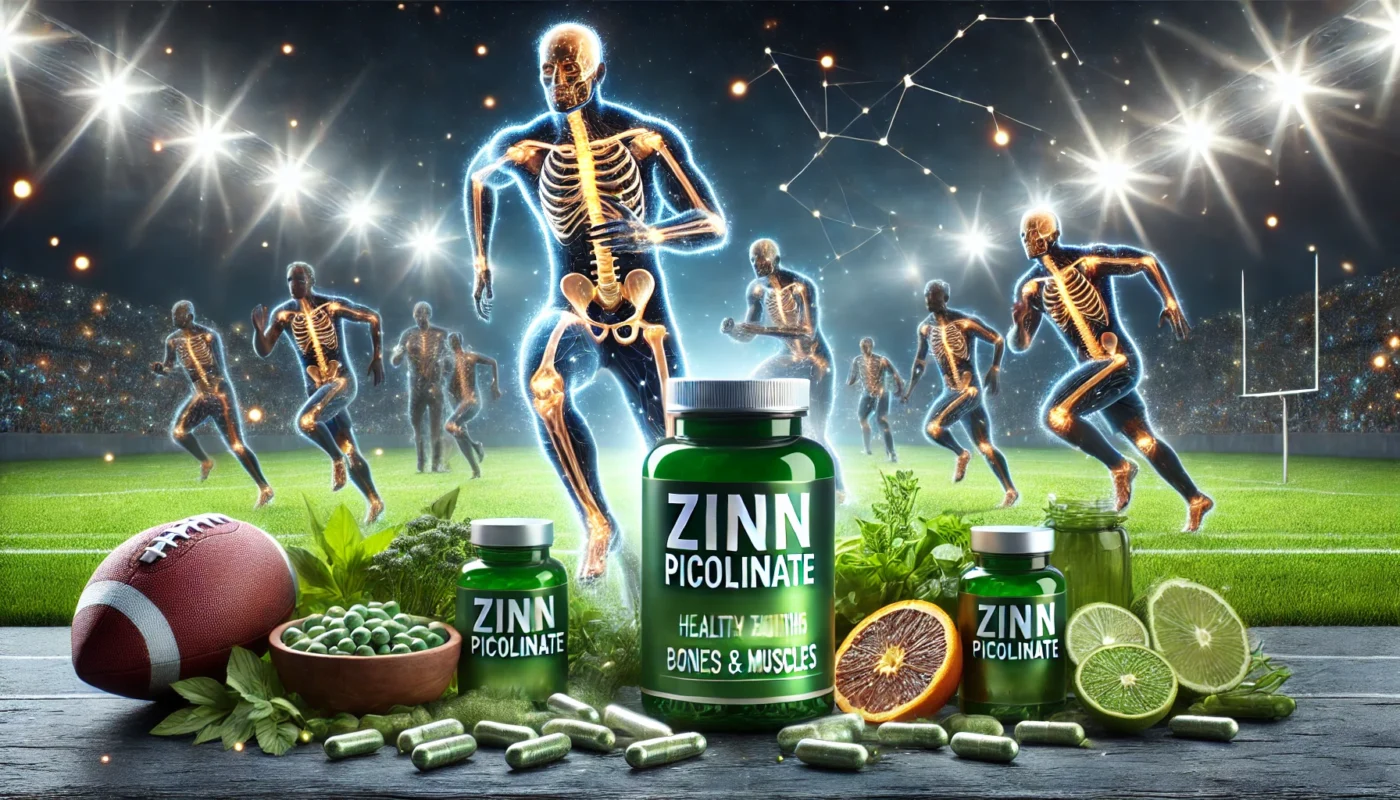Injury prevention is a critical concern for athletes and active individuals who push their bodies to the limit. From joint strain to muscle tears, the physical demands of sports and exercise increase the risk of injuries that can disrupt performance and long-term health. While training techniques and protective gear play significant roles in minimizing injuries, nutrition often takes a backseat despite its vital contribution to tissue health and resilience.
Zinc, an essential trace mineral, is a cornerstone of musculoskeletal health. It supports tissue repair, collagen synthesis, immune regulation, and inflammation control—all crucial for maintaining joint and tissue resilience. Zinc picolinate, a highly bioavailable form of zinc, enhances these benefits by ensuring optimal absorption and utilization. This article explores how zinc picolinate contributes to injury prevention in sports and physical activity, backed by scientific evidence and practical insights.
You May Also Like:
How Zinc Picolinate Helps Prevent Infections in Athletes: What Science Reveals
The Role of Zinc Picolinate in Reducing Exercise Fatigue
Zinc Picolinate for Injury Prevention in Sports: Enhancing Resilience is an original (HSLHealing) article.
Understanding Sports-Related Injuries
Sports injuries occur when the physical demands on the body exceed its ability to adapt, repair, or recover. Common sports-related injuries include:
- Muscle Strains: Overstretching or tearing of muscle fibers.
- Ligament Sprains: Overextension of ligaments, often in the ankle, knee, or wrist.
- Tendonitis: Inflammation of tendons due to repetitive stress.
- Stress Fractures: Microcracks in bones caused by repetitive impact or overuse.
Key Risk Factors for Injuries:
- Overtraining or lack of rest.
- Poor biomechanics or improper technique.
- Nutritional deficiencies impairing tissue repair and resilience.
Statistics:
- A report from the National Institutes of Health (NIH) states that 25% of athletes experience a sports-related injury annually.
- Studies in Sports Medicine highlight that nearly 50% of these injuries are overuse injuries, which can be mitigated with proper nutrition and recovery strategies.
The Role of Zinc in Joint and Tissue Health
Zinc is indispensable for maintaining the structural integrity and resilience of joints, muscles, tendons, and ligaments. Its functions include:
- Collagen Synthesis:
Zinc activates enzymes involved in collagen production, ensuring strong connective tissue and cartilage. - Tissue Repair and Regeneration:
Zinc supports fibroblasts, the cells responsible for producing new connective tissue during healing. - Bone Health:
Zinc is essential for bone mineralization and density, reducing the risk of fractures. - Reducing Inflammation:
Zinc modulates inflammatory responses, preventing excessive tissue damage and aiding recovery. - Antioxidant Defense:
Zinc protects cells from oxidative stress caused by intense physical activity, which can weaken tissues.
Prevent sports injuries and boost resilience with Zinc Picolinate—Stay Strong, Shop Now on Amazon!

What Is Zinc Picolinate?
Zinc picolinate is a chelated form of zinc, where zinc is bound to picolinic acid. This form enhances zinc absorption in the gastrointestinal tract, making it one of the most bioavailable zinc supplements available. For athletes and physically active individuals, zinc picolinate ensures that the body efficiently absorbs and utilizes zinc, maximizing its benefits for injury prevention.
How Zinc Picolinate Prevents Injuries
1. Enhancing Collagen and Connective Tissue Strength
Collagen is the primary structural protein in tendons, ligaments, and cartilage. Zinc picolinate supports enzymes like lysyl oxidase, which are essential for cross-linking collagen fibers, increasing the strength and elasticity of connective tissues.
- Study Insight: A study in Journal of Orthopedic Research found that zinc supplementation increased collagen synthesis by 20%, improving connective tissue resilience in athletes.
2. Supporting Muscle Repair and Recovery
Muscle strain is a common injury in sports. Zinc picolinate accelerates muscle repair by activating enzymes involved in protein synthesis and cellular regeneration.
- Clinical Evidence: Research in American Journal of Clinical Nutrition reported that zinc supplementation reduced muscle recovery time by 15% in participants after intense physical activity.
3. Strengthening Bone Density and Reducing Fracture Risk
Stress fractures are common in high-impact sports. Zinc picolinate supports bone mineralization by enhancing osteoblast activity, which is responsible for bone formation.
- Research Finding: A study in Bone demonstrated that zinc supplementation increased bone mineral density by 10% in athletes undergoing rigorous training.
4. Reducing Inflammation and Preventing Chronic Injuries
Inflammation from repetitive stress can weaken tendons and ligaments over time, leading to chronic injuries like tendonitis. Zinc picolinate modulates inflammatory cytokines, reducing tissue damage.
- Evidence: A study in Nutrients found that zinc reduced levels of pro-inflammatory markers like TNF-α and IL-6 by 25% in physically active individuals, promoting recovery and preventing chronic injuries.
5. Enhancing Antioxidant Protection Against Oxidative Stress
Intense exercise generates free radicals that can damage cells and tissues, increasing the risk of injury. Zinc picolinate boosts the activity of antioxidant enzymes like superoxide dismutase (SOD), neutralizing free radicals.
- Study Insight: Research in Free Radical Biology and Medicine showed that zinc supplementation increased antioxidant defenses by 35%, reducing oxidative damage in athletes.

Zinc Deficiency and Increased Injury Risk
Zinc deficiency can compromise tissue integrity, impair recovery, and increase susceptibility to injuries. Common causes of zinc deficiency include poor dietary intake, heavy sweating during exercise, and chronic stress.
Symptoms of Zinc Deficiency Include:
- Slow wound healing
- Frequent muscle cramps or strains
- Brittle bones or frequent fractures
- Increased inflammation and soreness
Statistics:
- According to the World Health Organization (WHO), 17% of the global population is at risk of zinc deficiency, with athletes being particularly vulnerable due to increased zinc losses through sweat and metabolic demands.
Dietary Sources of Zinc
While zinc picolinate supplementation is highly effective, incorporating zinc-rich foods into the diet can provide additional support for joint and tissue health. Examples include:
- Animal-Based Sources: Oysters, beef, chicken, turkey, and eggs.
- Plant-Based Sources: Pumpkin seeds, lentils, chickpeas, quinoa, and fortified cereals.
For athletes with dietary restrictions or high zinc needs, zinc picolinate provides a reliable and efficient alternative.
Recommended Dosage and Safety
The recommended dietary allowance (RDA) for zinc is:
- Men: 11 mg/day
- Women: 8 mg/day
For injury prevention and recovery, therapeutic doses of zinc picolinate typically range from 15–30 mg/day. Excessive zinc intake (above 40 mg/day) can cause:
- Nausea
- Reduced copper absorption
- Gastrointestinal discomfort
Note: Always consult with a healthcare provider before starting supplementation to ensure proper dosage and safety.

Integrating Zinc Picolinate into an Injury Prevention Plan
- Combine with Strength Training: Zinc picolinate supports tissue repair and resilience, complementing exercises that strengthen muscles and joints.
- Pair with Collagen Supplements: Combining zinc picolinate with collagen peptides enhances connective tissue health.
- Use During Recovery Periods: Zinc picolinate accelerates tissue repair, reducing downtime after minor injuries or intense training.
- Monitor Symptoms: Track improvements in soreness, recovery time, and injury frequency to assess the effectiveness of zinc supplementation.
Who Can Benefit from Zinc Picolinate for Injury Prevention?
- Athletes in High-Impact Sports: Zinc picolinate enhances joint and bone resilience in runners, basketball players, and gymnasts.
- Weightlifters and Bodybuilders: Zinc supports muscle repair and prevents strains from heavy lifting.
- Recreational Exercisers: Zinc promotes tissue recovery in individuals engaging in regular physical activity.
- Older Adults in Sports: Zinc combats age-related declines in tissue and bone strength.
Future Research Directions
While current studies highlight zinc picolinate’s benefits for injury prevention, further research could explore:
- Long-term impacts on chronic injury prevention.
- Synergistic effects with other nutrients like magnesium and vitamin D.
- Zinc’s role in reducing injury recurrence rates in athletes.
Conclusion: Zinc Picolinate for Resilience and Recovery
Zinc picolinate offers a powerful, science-backed solution for enhancing joint and tissue resilience, making it an essential nutrient for injury prevention in sports. By promoting collagen synthesis, supporting muscle repair, and reducing inflammation, zinc picolinate addresses the key factors contributing to sports-related injuries.
For athletes and active individuals seeking a natural way to maintain performance and reduce injury risk, incorporating zinc picolinate into their regimen provides significant benefits. As always, consult with a healthcare provider to tailor supplementation to your specific needs and ensure safe and effective use.

References
- Zinc as a Gatekeeper of Immune Function Retrieved from: https://pubmed.ncbi.nlm.nih.gov/29186856/
- Discovery of Human Zinc Deficiency: Its Impact on Human Health and Disease Retrieved from:https://www.sciencedirect.com/science/article
- Zinc and its role in immunity and inflammation Research. Retrieved from: https://www.sciencedirect.com/science/article/pii/S1568997214002808
- Free radicals and antioxidant strategies in sports Retrieved from: https://www.sciencedirect.com/science/article/pii/0955286394900558
- Zinc and Oxidative Stress: Current Mechanisms. Retrieved from: https://pmc.ncbi.nlm.nih.gov/articles/PMC5488004/
- Effect of zinc supplementation on antioxidant activity in young wrestlers. Retrieved from: https://pubmed.ncbi.nlm.nih.gov/19597720/
- Discovery of Human Zinc Deficiency: Its Impact on Human Health and Disease. Retrieved from: https://pmc.ncbi.nlm.nih.gov/articles/PMC3649098/
Important Note: The information contained in this article is for general informational purposes only, and should not be construed as health or medical advice, nor is it intended to diagnose, prevent, treat, or cure any disease or health condition. Before embarking on any diet, fitness regimen, or program of nutritional supplementation, it is advisable to consult your healthcare professional in order to determine its safety and probable efficacy in terms of your individual state of health.
Regarding Nutritional Supplements Or Other Non-Prescription Health Products: If any nutritional supplements or other non-prescription health products are mentioned in the foregoing article, any claims or statements made about them have not been evaluated by the U.S. Food and Drug Administration, and such nutritional supplements or other health products are not intended to diagnose, treat, cure, or prevent any disease.

